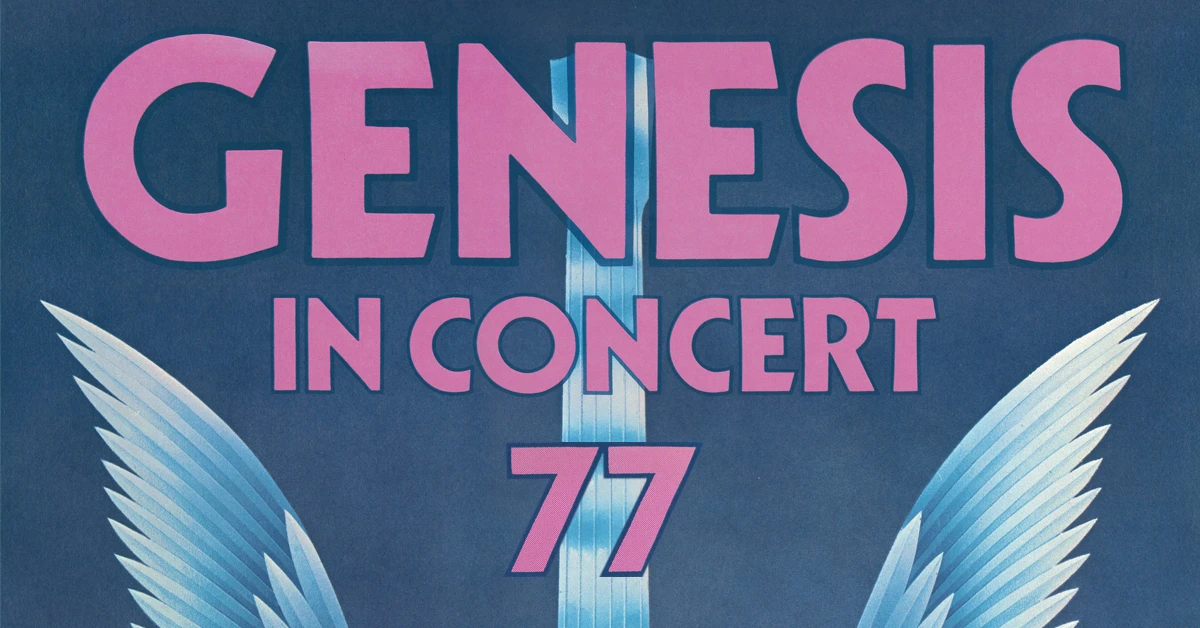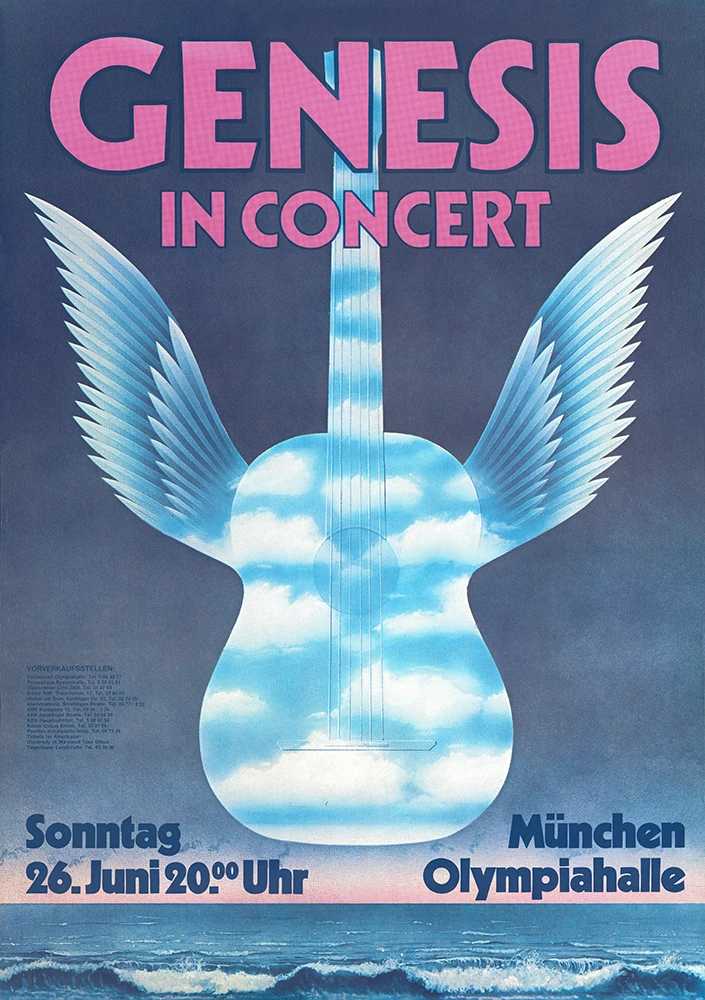- Article
- Read in 5 minutes
Genesis – Wind & Wuthering Tour 1977 – tour report
The Wind & Wuthering tour of Genesis was the first with Chester Thompson on drums – and the last with Steve Hackett.
The Wind & Wuthering Tour 1977 marked the end of an era – Steve Hackett left the band after the tour. And it also marked the beginning of a new era. Chester Thompson sat at the drums for the first time.
Preface
After the hugely successful A Trick Of The Tail tour, Genesis set to work on their next album in the autumn of 1976. They rented the Relight Studio in Hilvarenbeek, Holland. The new album, entitled Wind & Wuthering, was released in December 1976. Bill Bruford, who had taken on the role of Genesis’ drummer on the last tour, had in the meantime become involved in a band project he had set up with John Wetton and Rick Wakeman (which later became the group UK).
Chester Thompson replaces Bill Bruford
As a result of these activities, Bill Bruford was no longer available to Genesis, and Phil was once again faced with the task of finding a drummer to accompany the band on their upcoming live performances. After a long search, American jazz drummer Chester Thompson, who had previously played with groups such as Weather Report and Frank Zappa, was found.
At this point, with only nine days to go before the start of the tour, they retreated to their own practice studios, The Farmyard, in Berkshire, England, for rehearsals and to prepare for a gruelling year of touring.
Even before the release of Wind & Wuthering, the band had announced that a major world tour would follow. And indeed, preparations were underway for the most extensive and expensive tour Genesis had ever undertaken.
Technical equipment and visual effects
Amongst other things, 28 tonnes of sound and lighting equipment were transported in 5 lorries. 15 “employees” took care of the technical equipment and its perfect use during the shows.
They had also come up with some new ideas for the visual effects. For example, the lasers that had been trialled on the previous tour were to be used again, albeit in an improved form. The laser system they bought cost a staggering £60,000 and, in combination with the dry ice they used, created breathtaking effects.
They also had a great idea for spotlighting the stage. In addition to the ‘normal’ spotlights, 48 Boeing 747 landing lights were suspended from the ceiling in two parallel rows one behind the other, all shining vertically downwards. This gave the stage the appearance of a cage surrounded by white bars. Genesis continued to use this trademark on later tours.
Other very nice effects were also created to emphasise the visual side of some of the songs. For example, during the performance of All In A Mouse’s Night, a ‘rainbow’ was created by shining spectral-colour spotlights, positioned side by side behind the stage, onto dry ice. It was a very simple way to create a fantastic, mesmerising illusion.
Tour schedule and setlist
The tour schedule saw Genesis play the first of three shows at London’s legendary Rainbow Theatre on New Year’s Day 1977. The 150-year-old concert hall in Finsbury Park had closed in 1974 due to lack of funds, and Genesis were the first band to play there again after the theatre was renovated by three wealthy music fans. Concerts in England and Scotland followed, as well as a major tour of North America, where the band became even better known.
When choosing the set this time, they didn’t go quite as far back into the history of Genesis (as had been the case on the Trick tour). The band included many newer songs in the programme, but the classics were not neglected either.
During the three evenings at the Rainbow Theatre in London, the audience were able to enjoy the following songs:
Eleventh Earl Of Mar
The Carpet Crawlers
Firth Of Fifth
Your Own Special Way
Robbery, Assault & Battery
In That Quiet Earth
Afterglow
Lilywhite Lilith
Wot Gorilla?
One For The Vine
Squonk
All In A Mouse’s Night
Supper’s Ready
I Know What I Like
Dance On A Volcano
Los Endos
The Lamb Lies Down On Broadway
The Musical Box (Closing Section)
This set didn’t last very long though, as the band changed the order of the songs played in Birmingham. They cancelled Lilywhite Lilith, Wot Gorilla? and All In A Mouse’s Night and opened every show on the tour with Squonk. Due to the chart success of the Spot The Pigeon EP in England, the band decided to replace Your Own Special Way with Inside & Out after the Brazilian tour.
At the three shows at London’s Earl’s Court, Genesis played a version of The Knife with the middle section cut out as an encore, which naturally caused fits of hysteria among the fans.
Recordings and film material
Parts of the concerts at Earl’s Court in London and the Palais des Sports in Paris were also filmed. However, these recordings lie dormant in the broadcasters’ archives, and it is highly doubtful that they will ever be broadcast in full, or see the light of day as an official promotional video. In the past, the BBC has broadcast or made available for promotional purposes at least some of the recorded material from Earl’s Court.
During the tour it was decided to release a live album that would capture the fantastic atmosphere of the Genesis concerts of this period. The four shows at the Palais des Sports in Paris were recorded for this purpose. At the end of the tour they met at Trident Studios in London to mix the live material they had collected. They had decided not only to use the current recordings, but also to immortalise existing tapes from the Trick tour on the album. The finished double live album, entitled Seconds Out, was released in October 1977, taking us back to the Seventies and becoming a real cult object for many fans.
Changes in the band
However, an event clouded the good mood in the band and led to a significant change in the Genesis line-up. During the mixing of Seconds Out, Steve Hackett decided to leave the group and pursue his own ideas as a solo artist.
During the recording sessions for the Wind & Wuthering album there was already some tension between the musicians and even while on tour they were talking about the future of the band if Steve were to leave. So the confirming news did not come as a surprise or shock to Mike, Phil and Tony. They were sure that they would be able to cope with Steve’s departure.
The group received a special kind of motivational boost at the end of 1977 when they were voted the best live band of the year by the British music press. The accolade of course raised their profile, but it also showed that Genesis had finally established themselves as a top-class rock band.
Author: Bernd Zindler
first published in it-Magazin #10
Poster Image: George German


